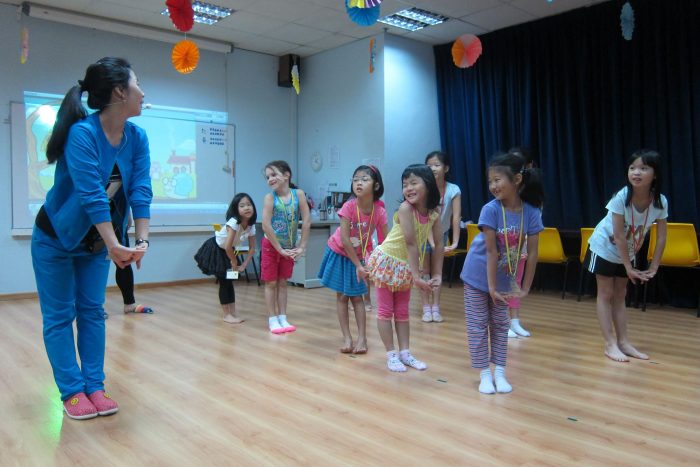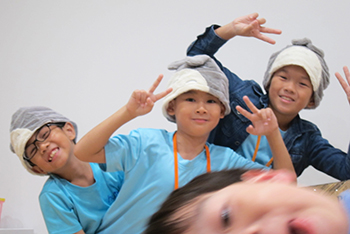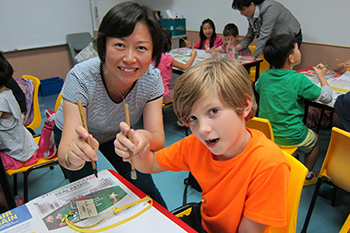7 Tips for Priming your Child for Chinese Success
Submitted by Advertiser KiasuParent
The struggle parents face in getting children to be proficient in Mandarin is not new. It has plagued parents for the last 30 years, or even more!
Most parents understand the growing importance of Mandarin and hope that their children will be proficient in the language. On top of doing well in school, parents hope that their children will develop a lasting bond with Chinese that will come in handy in their adulthood. Here are some tips on how to prime your child for Chinese success:

#1 Expose children to Mandarin at a young age
At birth, humans have the gift to learn all languages. Babies below the age of 6 months can differentiate sounds from all languages on the planet. However, between 6 and 12 months, they start filtering out sounds that they do not frequently hear. After 12 months, they will no longer register those sounds as being a language.
As Mandarin is a tonal language, non-Mandarin speakers register Mandarin sounds as music. Scientific research has shown that the brain of a child who is consistently exposed to conversations in Mandarin (watching videos don’t count!) before the age of 12 months processes Mandarin sounds in his left brain (the side for language) rather than his right brain (the side for music) even if he doesn’t speak a word of Mandarin.
If you’ve missed the 12-month window to lodge Mandarin subconsciously in your child’s brain, fret not! All toddlers are sponges for learning languages. With constant exposure, a toddler can pick up Mandarin easily as long as he is motivated to learn. How to motivate toddlers to learn? Make it fun and make it useful!
#2 Inculcate the right mindset
Chinese has the reputation of being a difficult language to learn because it is not phonetic. There is also a certain amount of memorization involved to learn the Chinese characters, which leads many to perceive it as a boring language to learn. We should refrain from perpetuating this mindset in our children.
Make positive statements like: “Chinese helps daddy in his work” and “Mommy likes listening to Chinese songs because the lyrics are so beautiful and poetic”.
Keep in mind that the perceived difficulty in learning Chinese is in learning to read and write, not listen and speak.


#3 Walk the Talk
Lead by example by using Mandarin yourself. If you are unable to speak Mandarin, you can consider learning together with your child. Picking up some basic phrases will convince your child that you think it is an important language too. Do not forget that interaction between parent and child is two-way: you’re observing him, and he’s observing you too!
If you can understand Mandarin, consider giving up your natural preference of watching television programmes in English and watch them in Mandarin instead.
Many parents have experienced resistance from their children when they speak to them in Mandarin. Our advice: persevere! You do not need to force them to reply in Mandarin, but you can insist on speaking Mandarin on your end. As long as you keep sowing the seeds and nurturing them, the time will come when they are ripe for harvesting.
#4 Vocabulary is key, not character recognition
Many parents get very excited when their children can read. Understandably so – since reading is a higher order skill than speaking. However, reading without understanding how to use the vocabulary does not build the right foundation required for Chinese fluency.
The beauty of the Chinese language is in how vocabulary is formed. You can learn to read 10 different Chinese characters but not understand the meaning of words formed by the permutation of these 10 characters. If your child was breezing through preschool Mandarin but is struggling by the time he hits P2, this could be the problem. He can read “一”, he can read “下” , he can read “子”, but he has no clue what “一下子” means.
Children who have an environment to speak Mandarin in their daily lives pick vocabulary up subconsciously through listening. Non-Mandarin speaking families can consider sending their children to Chinese enrichment classes where such vocabulary is deliberately introduced.
#5 Prepare ahead for P1 Chinese
Some people call it kiasu, we say it’s a way to build your child’s confidence towards Chinese. Learning many new words every week for a language you are not familiar with can be overwhelming for some children. When children feel like they will never catch up, they lose the motivation to learn.
Preparing ahead also gives your child the luxury of time to reinforce what he has learnt through songs, games and activities. This makes learning fun even if it does require a bit of memory work.
#6 Build up your vocabulary first if you are not proficient
Vocabulary is the building blocks of any language. Without a sizeable vocabulary bank, it is difficult to express yourself fully in the language.
If your child is struggling with Chinese in primary school, be sure to focus on mastering the core vocabulary in the syllabus first. By mastery, it’s not just the ability to read or write it.
Remember: listen, speak, read, and then write. Teaching a language always goes in that order. Make sure your child understands the meaning of the vocabulary when he hears it, teach him how to use it verbally in a sentence, and then teach him how to read and write the characters that make up the vocabulary.
#7 Find something your child likes and do it in Chinese
After mastering the core vocabulary, the next step is to master Chinese sentence structures. Has someone ever asked you an English grammar question why it’s A and not B, and your answer was “it just sounds more correct”? This is what we call a feel for the language. Developing a feel for the language is the best way to improve your Chinese sentence structures.
To develop a feel for a language, you need to constantly hear it, speak it and read it. Finding something your child likes will motivate him to be constant contact with the language. If he likes basketball, watch basketball matches in Mandarin and read the Chinese version of the manga Slam Dunk. If he likes baking, go for baking classes conducted in Mandarin and read recipe books in Chinese.
This article was written by Hua Language Centre, one of the pioneer Chinese enrichment centres in Singapore.
With their 25 years of experience, they are experts at teaching Chinese the fun and effective way. For more than 20 consecutive years, more than 90% of their students score A or A* in the PSLE Chinese exam. Despite that, peels of laughter often erupt from their classrooms.
Majority of their preschool students say goodbye to Hua as victorious P6 graduates. In fact, they even have students who graduated, got married, had kids and are now sending their kids to Hua!

Hua Language Centre
NOVENA
United Square #03-25/26
6255-5060
SELETAR
Greenwich V #02-09
6555-5780
WOODLANDS
Causeway Point #05-03
6894-7183

